All products featured are independently chosen by us. However, SoundGuys may receive a commission on orders placed through its retail links. See our ethics statement.
Sony WH-1000XM6 vs Sony WH-1000XM4: Finally worth upgrading?
May 19, 2025




The Sony WH-1000XM4 has been a fan favorite since its release, and for good reason. Even after the WH-1000XM5 launched with a sleek new design and similarly strong performance, many users stuck with the XM4 — whether due to its foldable frame, discounted price, or simply because the XM5 didn’t feel like a big enough leap in day-to-day use.
Now we’ve got the Sony WH-1000XM6, which aims to fix the nitpicks users had with previous models while subtly improving performance across the board. So, is this the real successor fans have been waiting for? Or does the WH-1000XM4 still have life left in it?
This article was originally published on May 19, 2025, and this is the first version.
What’s it like to use the Sony WH-1000XM6 compared to the WH-1000XM4?
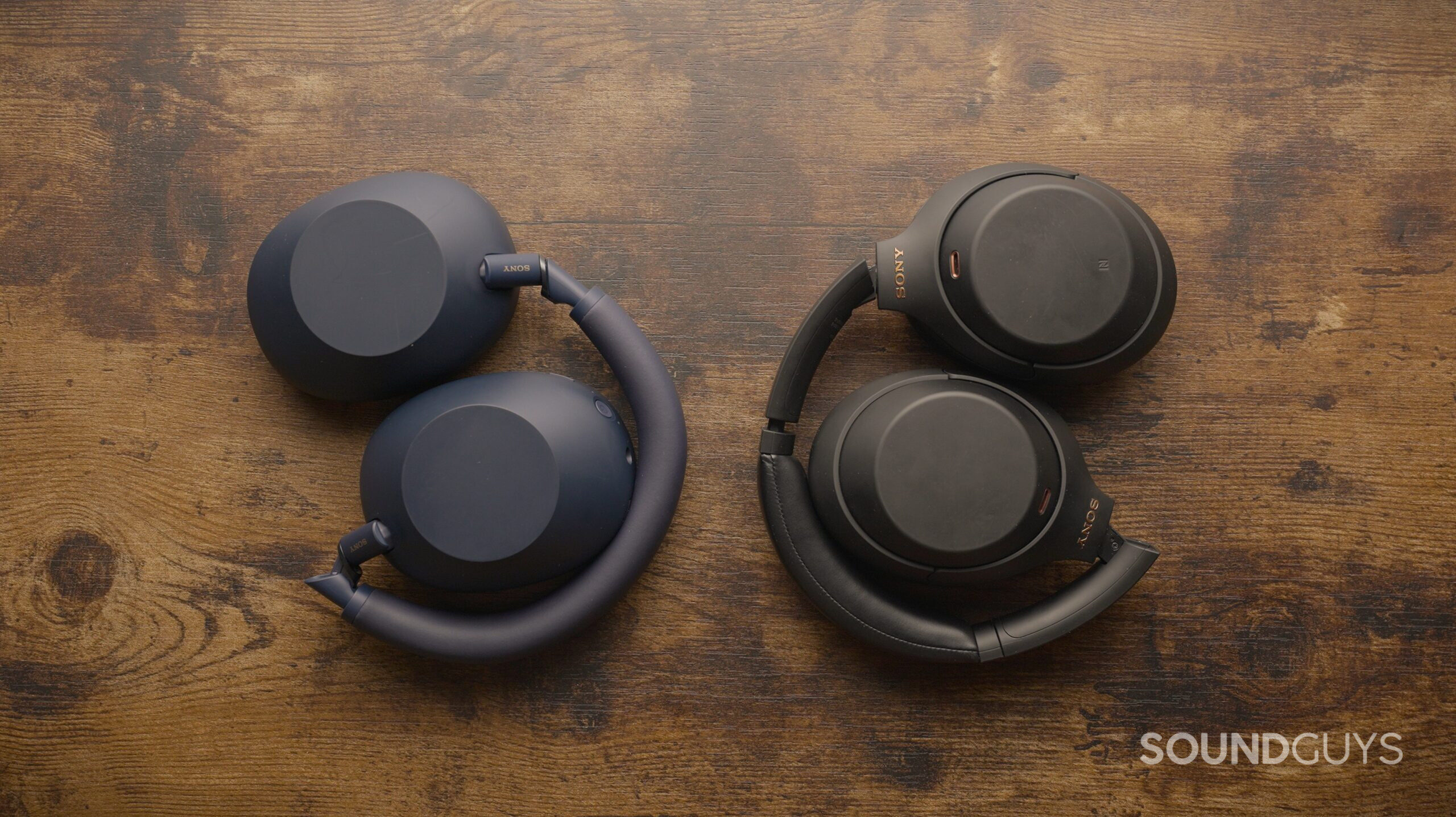
In day-to-day use, the WH-1000XM6 feels like Sony finally listened to all the little complaints from the XM5 that might have scared people off. It ditches the fragile hinge and awkward lay-flat-only design of the XM5, returning to something more like the XM4 — and then improving on it. The newly redesigned buttons are easier to use, and I appreciated not having to fuss with the app to get the most out of the experience.
Meanwhile, the WH-1000XM4 also offers a polished experience, with multipoint Bluetooth and a handy auto-pause feature. However, double-tap gestures occasionally misfire, and while the earcups are thick and comfortable, the thinner headband padding becomes noticeable during long listening sessions. If you compare them head-to-head, the XM6 is the more refined headset to use daily, but both perform reliably well.
| INPUT | Right earcup surface |
|---|---|
Double tap | Play / pause |
Long press | Voice assistant |
Swipe up / Down | Volume up / down |
Swipe forward / back | Track forward / back |
Cup hand | Passthrough mode |
| Control | Music | Calls |
|---|---|---|
| Control Swipe up | Music Volume up | Calls Volume up |
| Control Swipe down | Music Volume down | Calls Volume down |
| Control Swipe forward | Music Skip song | Calls |
| Control Swipe back | Music Skip back | Calls |
| Control Double tap | Music Play/pause | Calls Answer call/hang up |
| Control Palm over touch panel | Music Ambient sound passthrough | Calls |
| Control Multi-function button | Music Toggle ANC/Transparency/ Regular audio or activate virtual assistant | Calls |
Do the Sony WH-1000XM6 or WH-1000XM4 have more features?
The WH-1000XM6 comes packed with features that power users will love. Using the Sony Sound Connect app, you can access a 10-band EQ, spatial audio upmixing, DSEE Extreme, volume limiting, and more. It also has AI-powered call handling, head gestures, and improved passthrough functions. However, the lack of USB-C audio and Auracast support could become problematic as audio tech standards evolve.
The WH-1000XM4 doesn’t feel outdated either. It still boasts multipoint connectivity, speak-to-chat, adaptive sound control, 360 Reality Audio, and EQ customization through the app. That said, it doesn’t support LE Audio or some of the newer features Sony introduced with the XM6. Still, for most people, the XM4 has everything you’d need.
How do the Sony WH-1000XM6 and WH-1000XM4 connect?
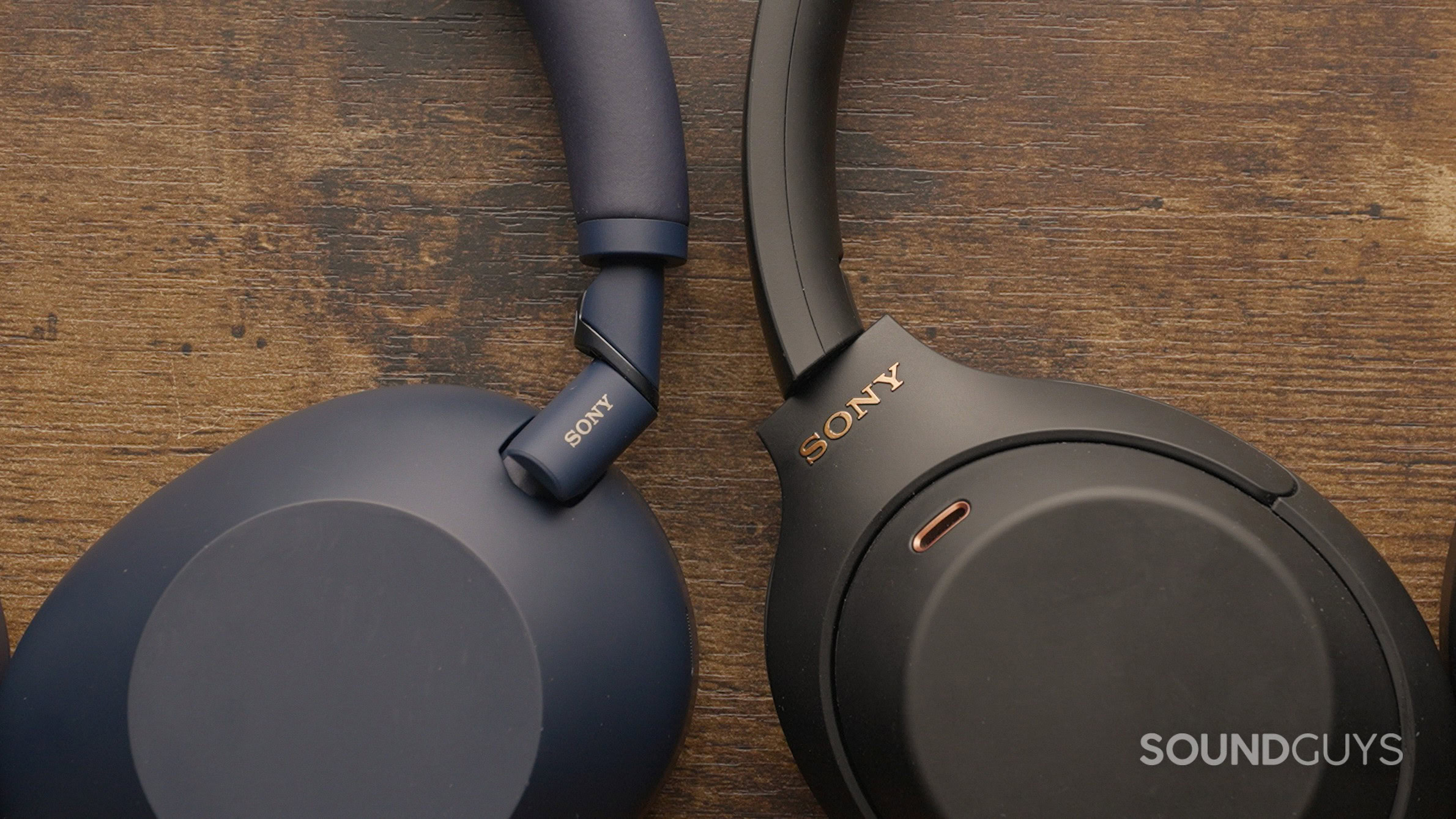
Sony upgrades the XM6 to Bluetooth 5.3, supporting SBC, AAC, LDAC, and LC3. It allows multipoint, though you’ll have to give up LDAC to use it. Wired listening is still available via 3.5mm, but you can’t listen through the USB-C port. Auracast is technically supported in the documentation, but it didn’t work during testing — a possible future firmware fix.
The XM4 uses the older Bluetooth 5.0 and supports SBC, AAC, and LDAC. Multipoint works great, but only with AAC, which limits sound quality for Android users. Still, the connection stays rock solid even when moving around a decent-sized apartment. USB-C charging is available here, but like the XM6, there’s no USB audio passthrough.
Is battery life better on the Sony WH-1000XM6 or WH-1000XM4?
In our tests, the WH-1000XM6 ran for 37 hours and 14 minutes with ANC on — a notable improvement over its predecessors and enough for most long-haul travelers. It supports fast charging too, promising about 3 hours of playback with just 3 minutes plugged in.
By comparison, the XM4 clocked in at just under 20 hours in our same test conditions, which is slightly less than the XM3. While Sony claims 30 hours, real-world use just doesn’t hit that number. However, a quick 10-minute charge does get you 5 hours of use, which can be a lifesaver in a pinch.
Do the Sony WH-1000XM6 or Sony WH-1000XM4 block noise better?
Loading chart ...
Noise canceling on the WH-1000XM6 is excellent, thanks in part to strong passive isolation and the powerful Q3 chip. In my testing, it handled low-end rumbles and high-frequency annoyances equally well, especially in variable environments. That said, glasses wearers might still notice seal issues due to the thinner ear pads.
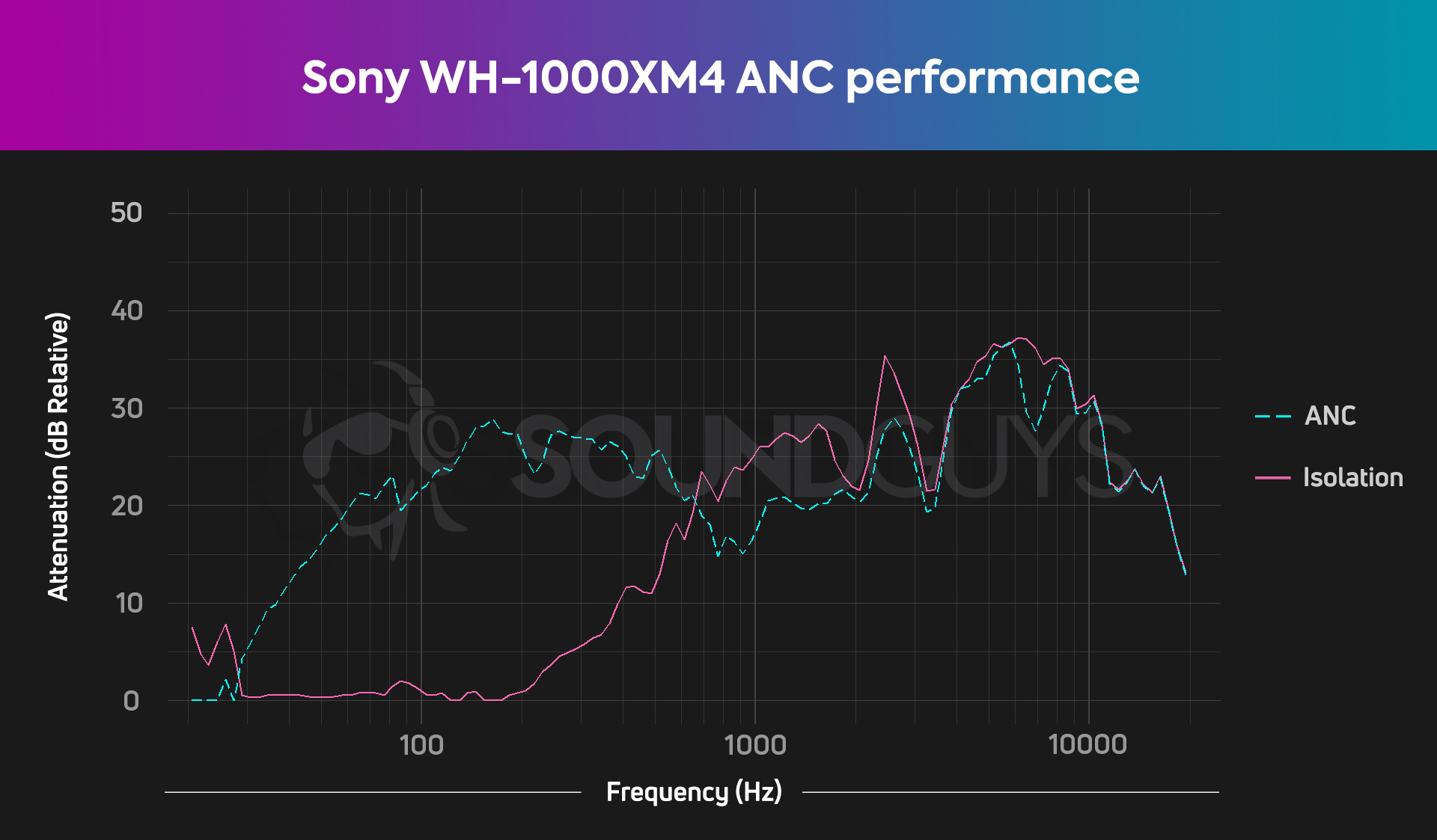
The WH-1000XM4 still offers top-tier ANC for its price, especially in the lower frequencies like airplane hum or office HVAC. It slightly outperforms the XM5 in the 120–600Hz range but falls behind in the upper mids and highs. Compared to the XM6, the XM4 is a step behind, but still very good overall.
Do the Sony WH-1000XM6 sound better than the Sony WH-1000XM4?
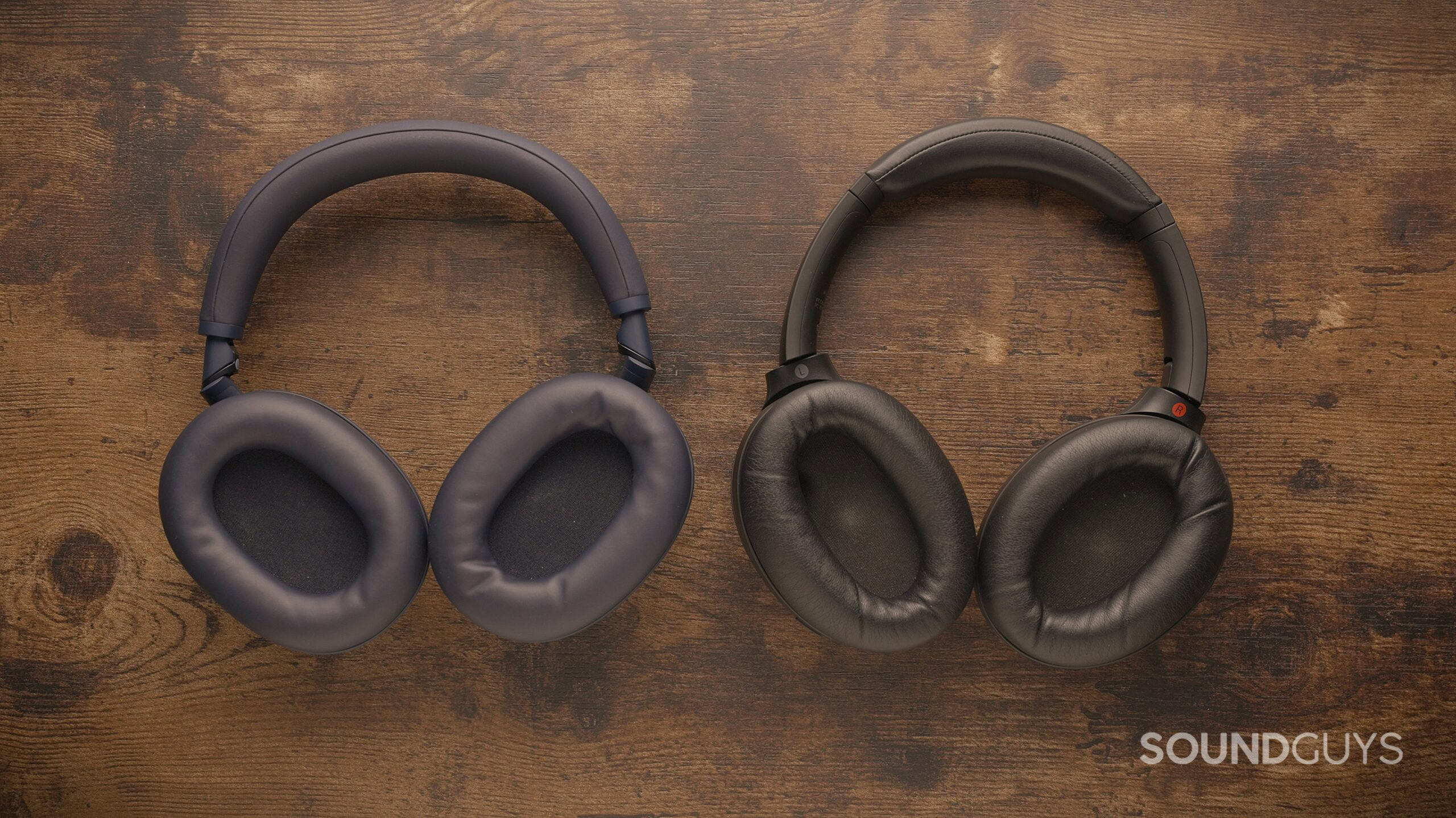
The WH-1000XM6 is Sony’s best-sounding ANC headphone yet. It avoids the overly bass-heavy tuning that the XM5 exhibited and delivers a warm sound that most listeners will enjoy. The treble peaks give music a sense of detail and air, while the improved driver design keeps Distortion low, even with higher-end codecs like LDAC.
The WH-1000XM4 also sounds excellent. It handles mids and highs well, making vocals and acoustic tracks shine. Bass is slightly restrained compared to most consumer headphones, which some may find refreshing. EQ options in the app help tailor things further for either headphone.
Multi-Dimensional Audio Quality Scores (MDAQS)
The XM6 earned standout scores: Timbre (4.9), Distortion (4.3), Immersiveness (4.6), and Overall (4.8) — these are among the best results we’ve seen in this line. The XM4, by comparison, scored Timbre (4.1), Distortion (3.4), Immersiveness (4.7), and Overall (4). So while still strong, the XM4 clearly trails the XM6 in overall fidelity and cleanliness.
- Timbre (MOS-T) represents how faithfully the headphones reproduce the frequency spectrum and temporal resolution (timing information).
- Distortion (MOS-D) represents non-linearities and added noise: higher scores mean cleaner reproduction.
- Immersiveness (MOS-I) represents perceived source width and positioning: how well virtual sound sources are defined in three-dimensional space.
Objective Measurements
Loading chart ...
Compared to our industry-validated preference curve, both headphones lean into a subtle bass lift without going overboard. The treble region on the XM6 is extended but not harsh, creating a pleasing tonal balance. The XM4, meanwhile, offers slightly under-emphasized mids and very over-emphasized highs, which can become fatiguing. If you like a warmer sound out of the box, the XM6 is the better pick.
Do the Sony WH-1000XM6 or Sony WH-1000XM4 have a better microphone?
The WH-1000XM6 features a new AI-based microphone system with a six-mic beamforming array, and it works. In our office, street, and windy conditions tests, the XM6 kept voices clear and background noise at bay. Wind handling, in particular, was impressive — far better than most ANC headphones I’ve tested.
The WH-1000XM4 microphone is adequate but unremarkable. Our lab testing found it slightly lacks low-frequency detail, and while it holds up for calls or Zoom meetings, it doesn’t isolate your voice as well in noisy conditions. If call quality is a big deal, the XM6 offers a clear advantage.
Sony WH-1000XM6 microphone demo (Ideal conditions):
Sony WH-1000XM4 microphone demo (Ideal conditions):
Sony WH-1000XM6 microphone demo (Office conditions):
Sony WH-1000XM4 microphone demo (Office conditions):
Sony WH-1000XM6 vs Sony WH-1000XM4: Price and availability
At launch, the WH-1000XM6 retails for $449.99, which matches current ANC flagships from other brands. It’s widely available and will likely see discounts in the future.
The WH-1000XM4 originally launched at $348 but has frequently been discounted since the XM5’s release. New or refurbished units can be found on sale for under $200, making it a solid budget-friendly option for those who want Sony’s hallmark experience without breaking the bank.
Should you get the Sony WH-1000XM6 or Sony WH-1000XM4?
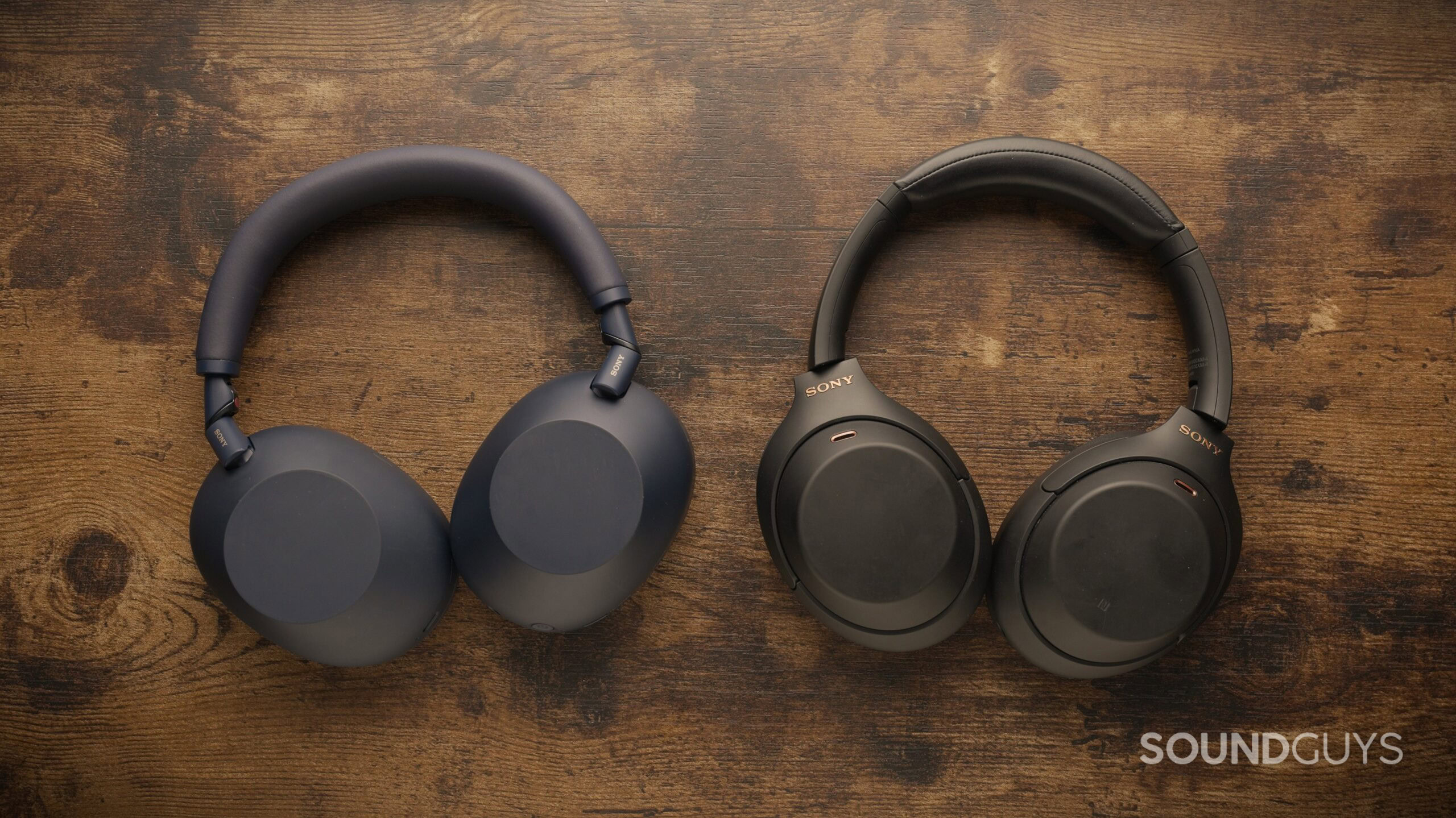
If you want the absolute best that Sony offers and aren’t worried about spending more, the WH-1000XM6 is the clear winner. It improves on the XM4’s already great formula with better ANC, cleaner sound, smarter features, and a more refined build.
However, if you’re price-sensitive or want excellent ANC headphones without needing or wanting to go all-in on the latest and greatest, the WH-1000XM4 still holds up admirably. It’s not future-proof, but if you aren’t planning to upgrade your phone soon anyway, it’s still compelling value today.


Sound quality
Connectivity options
Auto-wear detection
Thank you for being part of our community. Read our Comment Policy before posting.